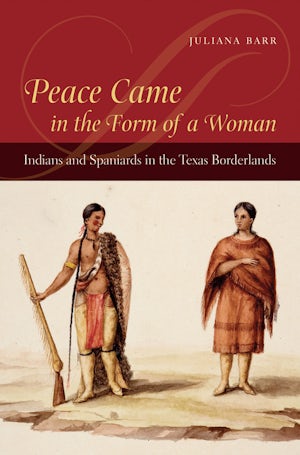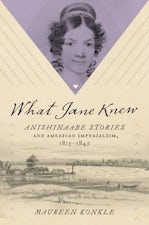Peace Came in the Form of a Woman
Indians and Spaniards in the Texas Borderlands
By Juliana Barr
416 pp., 6.125 x 9.25, 24 illus., 4 maps, notes, bibl., index
-
Paperback ISBN: 978-0-8078-5790-8
Published: March 2007 -
E-book EPUB ISBN: 978-0-8078-6773-0
Published: November 2009 -
E-book PDF ISBN: 979-8-8908-7691-1
Published: November 2009
Buy this Book
- Paperback $40.00
- E-Book $20.99
For Professors:
Free E-Exam Copies
Awards & distinctions
2008 Charles S. Sydnor Award, Southern Historical Association
2008 Berkshire Conference First Book Prize, Berkshire Conference of Women Historians
2007 William P. Clements Prize for the Best Nonfiction Book on Southwestern America, William P. Clements Center for Southwest Studies
2008 Texas Old Missions and Forts Restoration Book Award, Texas Catholic Historical Society
2007 Murdo J. MacLeod Prize, Latin American and Caribbean Section, Southern Historical Association
2007 Liz Carpenter Award, Texas State Historical Association
Barr argues that Indians not only retained control over their territories but also imposed control over Spaniards. Instead of being defined in racial terms, as was often the case with European constructions of power, diplomatic relations between the Indians and Spaniards in the region were dictated by Indian expressions of power, grounded in gendered terms of kinship. By examining six realms of encounter--first contact, settlement and intermarriage, mission life, warfare, diplomacy, and captivity--Barr shows that native categories of gender provided the political structure of Indian-Spanish relations by defining people's identity, status, and obligations vis-à-vis others. Because native systems of kin-based social and political order predominated, argues Barr, Indian concepts of gender cut across European perceptions of racial difference.
Published in association with The William P. Clements Center for Southwest Studies at Southern Methodist University in Dallas, Texas
About the Author
Juliana Barr is Research Foundation Professor of History at the University of Florida.
For more information about Juliana Barr, visit
the
Author
Page.
Reviews
"Transforming enemies into allies took decades, and Barr offers a way to begin revising and rethinking the literature on these . . . encounters."—Journal of American History
"A highly valuable contribution to the indigenous historiography of the southwestern borderlands in the early period of European contact."—Journal of Southern History
"Engaging and beautifully written. . . . Provides vivid accounts of Indian power and the gendered ways it was expressed."—Western Historical Quarterly
"Historiographically significant and beautifully written, Peace Came in the Form of a Woman will enjoy a wide readership among those interested in early American, Native American, and Borderlands history."—Journal of American Ethnic History
"A field-changing work. . . . The first to show how really essential gender is to contact studies."—William and Mary Quarterly
"Rich, complex, and detailed. . . . A well-crafted and thoughtful work that does much to alter the landscape of American history."—Signs




